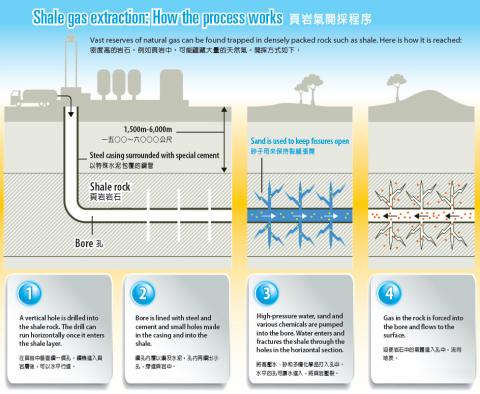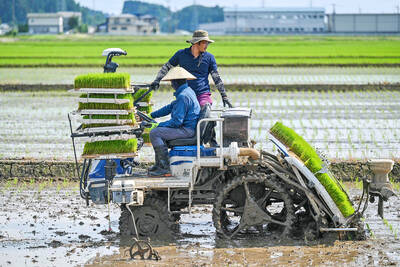Hydraulic fracking (or fracking) has been hailed as an energy miracle in the US, yet globally it faces blocks and even bans. Adam Vaughan explains what it is and why it is so controversial:
What is fracking?
Hydraulic fracturing, or fracking as it is better known, is a method of extracting oil and gas trapped in shale and other rock formations. The modern version involves pumping large amounts of water down a well at high pressure, along with sand and chemicals that make up a tiny fraction of the volume.

Photo: The Guardian
照片:衛報
Together, this “stimulation fluid” fractures the rock and releases the gas or oil, which flows to the surface. The sand is there to keep fractures in the rock open. The chemicals are included for several purposes, such as lubrication and keeping bacteria out.
The other big technological development that has made fracking economical is horizontal drilling. This means that several horizontal boreholes can be drilled off one well, like tributaries off a river, maximising the amount of oil and gas that can be recovered.
Who pioneered fracking?
Fracking transformed the US energy landscape, putting the country on course to becoming a net exporter of oil after output declined over the last three decades of the 20th century. That trajectory means it is now starting to create similar shockwaves globally.
The modern version of fracking came of age in the late 1990s, unlocking oil and gas reserves across more than 20 US states. As a result, US oil production has increased faster than at anytime in the country’s history, dwarfing the giddy days of the country’s black gold rush in the 19th century. About half of US crude now comes from fracking.
Why is fracking so controversial?
Water contamination has been one of the biggest environmental concerns. A years-long piece of research by the US Environmental Protection Agency concluded in 2016 that in some cases fracking had harmed drinking water supplies.
Earthquakes due to hydraulic fracturing have been another big concern. In Oklahoma, experts have reported a millennium’s worth of quakes in two years because of fracking there.
The big picture issue, of course, is climate change. Fracking advocates have argued the technology is good for global warming because, at least in the US, gas has been displacing coal in the power mix. But that coal is usually still burned elsewhere in the world, meaning fracking is simply adding to fossil fuel supplies — and the stock of greenhouse gases in the atmosphere.
What does the future hold?
In the short term, fracking looks likely to stay as a largely American story, unless China decides to seriously invest in extracting its vast shale gas reserves, which are estimated to eclipse those in the US.
“What is happening in the US is all driven by the shale revolution,” said Fatih Birol, executive director of the International Energy Agency. That revolution will have profound ramifications around the world for years to come, from Europe’s reliance on Russian gas to US foreign policy and headaches for the oil cartel, OPEC.
(The Guardian)
開採頁岩油所用的水力壓裂法,在美國被譽為能源奇蹟,但壓裂法在全球仍面臨阻礙甚至禁令。英國衛報能源記者亞當‧范恩解釋了何為壓裂法,及其為何如此充滿爭議:
什麼是壓裂法?
水力壓裂法,或較為人所熟知的名稱「壓裂法」,是一種開採頁岩和其他種類岩層中油氣的方法。現代的壓裂技術是將大量的水,摻入少部分的砂和化學物質,以高壓注入井中。
這種混合成的壓裂液,是用液壓碎裂岩石、釋放其中的氣體或油,使之流向地表。砂的功用是要讓岩石的裂縫保持敞開,化學物質則有多種用途,例如潤滑和防止細菌入侵。
「水平鑽井」則是讓壓裂技術成本經濟的另一大技術進展——這使得由一口井中,可以鑽出數個水平的孔,像河川的支流一樣,讓獲取的油氣量最大化。
誰開創了壓裂法?
壓裂技術改變了美國的能源格局,使美國在二十世紀最後三十年石油產量下降後,能夠變成石油淨出口國。這條成功的軌跡,意味全球都可如法炮製,創造類似的效益。
在二十世紀九○年代後期,現代化的壓裂作業已經成熟,將美國二十多個州的石油和天然氣儲量釋放出來。因此,美國石油產量的增長速度超過歷史上任何時期,讓美國十九世紀淘金熱時期的盛況相形見絀。如今美國約有一半的原油是由壓裂技術開採的。
為什麼壓裂法爭議如此之大?
水污染已成為壓裂法最大的環境問題之一。美國環境保護局於二○一六年發表一項歷時數年的研究,發現在某些案例中,壓裂法對飲用水造成了汙染。
水力壓裂引起的地震,則是另一大問題。有專家報告說,奧克拉荷馬州兩年內所發生的上千次地震,是肇因於當地進行的壓裂工程。
當然,更宏觀的問題是氣候變化。擁護壓裂法的人認為,這種技術對減緩全球暖化有所助益,因為至少在美國,天然氣已經在電力結構中取代了煤炭。但世界其他地方仍燃燒煤炭,因此壓裂法只不過是增加了化石燃料供應、增加了大氣中的溫室氣體。
未來將何去何從?
短期來看,美國仍會是以壓裂法開採頁岩油的主要國家,除非中國決定認真投資開採其巨大的頁岩氣儲量。
國際能源署執行董事法提‧畢羅說:「在美國發生的一切都是由頁岩油革命驅動的」。未來數年內,從歐洲對俄羅斯天然氣的依賴,到美國的外交政策、處理聯合壟斷的石油輸出國組織等棘手問題,都可看到這場革命對世界各地所產生深遠的影響。
(台北時報林俐凱編譯)

Rice is essential to Japanese culture, tradition and politics. People take pride in the oval-shaped sticky Japonica grain, which is still a staple even though total consumption has fallen over the decades. But since last summer, prices have soared as supplies have fallen short of demand. The government has long paid farmers to cut back on rice acreage, and change to other crops to keep rice prices relatively high. To cope with shortfalls this year, the government has released rice reserves. But the grain has been slow to reach supermarket shelves. Anger over that was part of the reason the Agriculture Minister

Step into any corner of Turkiye, and you’ll likely encounter the iconic “Evil Eye,” known as “nazar boncu?u” in Turkish. This striking blue glass ornament is shaped like an eye with concentric circles of dark blue, white, and light blue. While its name in English suggests something threatening, it’s actually a charm designed to ward off misfortune. The origins of the nazar boncu?u can be traced back to ancient Mediterranean and Middle Eastern traditions. The word nazar comes from Arabic, meaning “gaze,” while boncu?u translates to “bead” in Turkish. Central to the nazar boncu?u’s mythology is the idea that

A: Wow, Les Miserables Staged Concert Spectacular is visiting Taiwan for the first time. B: Isn’t Les Miserables often praised as one of the world’s four greatest musicals? A: Yup. Its concert is touring Taipei from tonight to July 6, and Kaohsiung between July 10 and 27. B: The English version of the French musical, based on writer Victor Hugo’s masterpiece, has been a huge success throughout the four decades since its debut in 1985. A: The musical has never toured Taiwan, but going to the concert sounds like fun, too. A: 哇,音樂劇《悲慘世界》紀念版音樂會首度來台巡演! B: 《悲慘世界》……它不是常被譽為全球四大名劇之一嗎? A: 對啊音樂會將從今晚到7月6日在台北演出,從7月10日到27日在高雄演出。 B: 這部法文音樂劇的英文版,改編自維克多雨果的同名小說,自1985年首演以來,在過去40年造成轟動。 A:

Continued from yesterday(延續自昨日) https://www.taipeitimes.com/News/lang In 1946, the company adopted the name 7-Eleven to reflect its newly extended __3__, from 7am to 11pm, a novel concept at the time. As a rapidly growing company, it began offering franchise opportunities in the 1960s. In 1974, the first 7-Eleven in Japan was opened by the supermarket company Ito-Yokado. The Japanese franchises were __4__ successful that by 1991, Ito-Yokado was able to acquire a 70 percent stake in Southland Corporation. Its investments eventually resulted in full ownership of 7-Eleven, which paved the way for the Japanese company to enter the international market. Since then, 7-Eleven